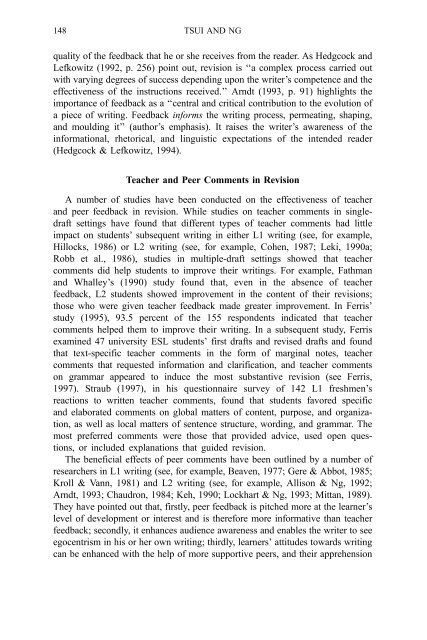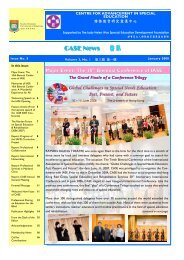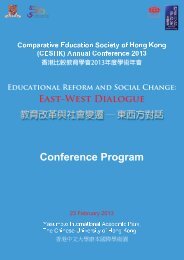Do Secondary L2 Writers Benefit from Peer Comments?
Do Secondary L2 Writers Benefit from Peer Comments?
Do Secondary L2 Writers Benefit from Peer Comments?
Create successful ePaper yourself
Turn your PDF publications into a flip-book with our unique Google optimized e-Paper software.
148 TSUI AND NG<br />
quality of the feedback that he or she receives <strong>from</strong> the reader. As Hedgcock and<br />
Lefkowitz (1992, p. 256) point out, revision is ``a complex process carried out<br />
with varying degrees of success depending upon the writer's competence and the<br />
effectiveness of the instructions received.'' Arndt (1993, p. 91) highlights the<br />
importance of feedback as a ``central and critical contribution to the evolution of<br />
a piece of writing. Feedback informs the writing process, permeating, shaping,<br />
and moulding it'' (author's emphasis). It raises the writer's awareness of the<br />
informational, rhetorical, and linguistic expectations of the intended reader<br />
(Hedgcock & Lefkowitz, 1994).<br />
Teacher and <strong>Peer</strong> <strong>Comments</strong> in Revision<br />
A number of studies have been conducted on the effectiveness of teacher<br />
and peer feedback in revision. While studies on teacher comments in singledraft<br />
settings have found that different types of teacher comments had little<br />
impact on students' subsequent writing in either L1 writing (see, for example,<br />
Hillocks, 1986) or <strong>L2</strong> writing (see, for example, Cohen, 1987; Leki, 1990a;<br />
Robb et al., 1986), studies in multiple-draft settings showed that teacher<br />
comments did help students to improve their writings. For example, Fathman<br />
and Whalley's (1990) study found that, even in the absence of teacher<br />
feedback, <strong>L2</strong> students showed improvement in the content of their revisions;<br />
those who were given teacher feedback made greater improvement. In Ferris'<br />
study (1995), 93.5 percent of the 155 respondents indicated that teacher<br />
comments helped them to improve their writing. In a subsequent study, Ferris<br />
examined 47 university ESL students' first drafts and revised drafts and found<br />
that text-specific teacher comments in the form of marginal notes, teacher<br />
comments that requested information and clarification, and teacher comments<br />
on grammar appeared to induce the most substantive revision (see Ferris,<br />
1997). Straub (1997), in his questionnaire survey of 142 L1 freshmen's<br />
reactions to written teacher comments, found that students favored specific<br />
and elaborated comments on global matters of content, purpose, and organization,<br />
as well as local matters of sentence structure, wording, and grammar. The<br />
most preferred comments were those that provided advice, used open questions,<br />
or included explanations that guided revision.<br />
The beneficial effects of peer comments have been outlined by a number of<br />
researchers in L1 writing (see, for example, Beaven, 1977; Gere & Abbot, 1985;<br />
Kroll & Vann, 1981) and <strong>L2</strong> writing (see, for example, Allison & Ng, 1992;<br />
Arndt, 1993; Chaudron, 1984; Keh, 1990; Lockhart & Ng, 1993; Mittan, 1989).<br />
They have pointed out that, firstly, peer feedback is pitched more at the learner's<br />
level of development or interest and is therefore more informative than teacher<br />
feedback; secondly, it enhances audience awareness and enables the writer to see<br />
egocentrism in his or her own writing; thirdly, learners' attitudes towards writing<br />
can be enhanced with the help of more supportive peers, and their apprehension

















